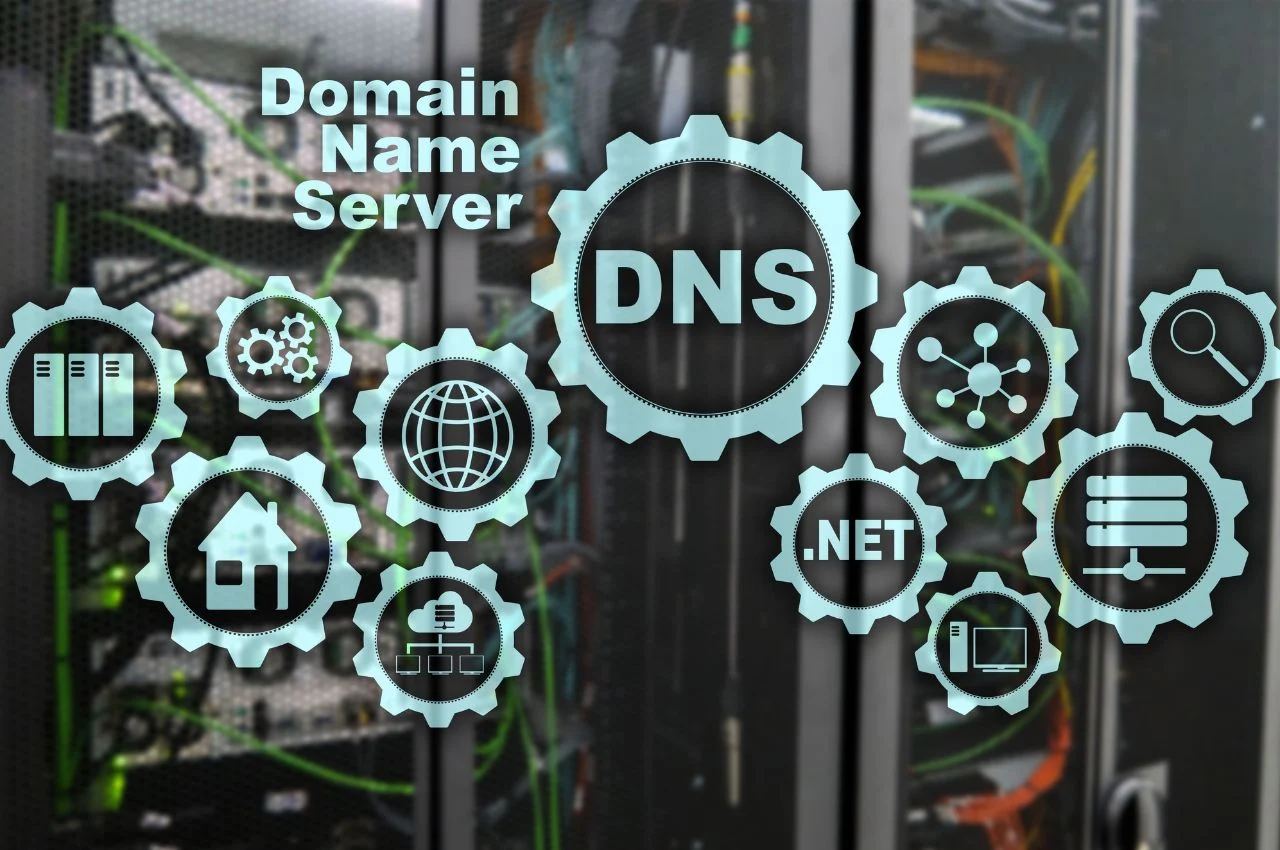A Domain Name Server (DNS) translates domain names into IP addresses. It helps locate websites on the internet.
In today’s digital world, a Domain Name Server (DNS) plays a crucial role in ensuring smooth and efficient internet connectivity. By converting user-friendly domain names into machine-readable IP addresses, DNS facilitates seamless communication between devices and servers. Essentially functioning as the internet’s address book, DNS enables users to access websites by typing in familiar domain names rather than complex numerical IP addresses.
Understanding the significance of DNS is essential for website owners, IT professionals, and internet users alike, as it underpins the functionality and accessibility of the online landscape. So, let’s delve deeper into the world of DNS and its impact on our daily digital interactions.
Table of Contents
The Basics of Domain Name Servers
A Domain Name Server (DNS) is a crucial component of the Internet infrastructure. It is essentially a system that translates domain names into IP addresses, allowing users to access websites and other online resources using easy-to-remember domain names rather than complex numerical IP addresses.

The Function of Domain Name Servers
Domain Name Servers serve the primary function of facilitating the translation of human-readable domain names into machine-readable IP addresses. When a user enters a domain name into their web browser, the DNS server is responsible for finding the corresponding IP address associated with that domain name, enabling the user to access the intended website or online service.
Types of Domain Name Servers
- A Primary Name Server is the initial point of contact for a domain and holds the authoritative DNS records.
- A Secondary Name Server acts as a backup to the Primary Server, ensuring redundancy and reliability.
- A Caching Name Server temporarily stores DNS query results to speed up future requests.
How Domain Name Servers Work
- Domain Name Servers (DNS) act as the internet’s address book, translating domain names into IP addresses.
- When a user enters a domain name, the DNS server looks up the associated IP address in its database.
- It then directs the user to the correct website, enabling seamless internet browsing.
- In a hierarchical system, root servers are at the top, followed by TLD servers, and then authoritative servers.
- Each level of servers helps resolve domain names until reaching the specific IP address.
Setting up a Domain Name Server
Setting up a Domain Name Server (DNS) is essential for managing the domain names associated with your website. By configuring a DNS server, you can ensure that visitors are directed to the correct web servers and email servers when they enter your domain name into their browsers or email clients. This process involves choosing the right server software, configuring DNS records, and ensuring the smooth functioning of your domain’s online presence.
Choosing The Right Server Software
When setting up a DNS server, it’s crucial to select the appropriate server software to handle the domain name resolution process efficiently. Popular DNS server software includes BIND (Berkeley Internet Name Domain), Microsoft DNS, and PowerDNS. Each of these options comes with its own set of features and capabilities, so it’s important to evaluate your specific needs and choose the software that best aligns with your requirements.
Configuring DNS Records
After selecting the appropriate server software, the next step in setting up a DNS server involves configuring DNS records. DNS records contain essential information about your domain, such as the IP address of your web server, mail server settings, and other domain-related data. By creating and managing DNS records, you can ensure that your domain name is correctly linked to the corresponding servers, enabling seamless communication between your website and its visitors.
Common Issues with Domain Name Servers
Issues with Domain Name Servers (DNS) can lead to website downtime, email delivery problems, and accessibility issues. Common issues include DNS propagation delays after changes, misconfigurations causing resolution failures, DNS cache poisoning leading to security risks, and Distributed Denial of Service (DDoS) attacks affecting server availability. Regular monitoring, timely updates, and configuring DNS settings correctly help mitigate these issues and ensure reliable internet connectivity.

DNS Propagation Delays
DNS propagation delays refer to the time it takes for changes to a domain name’s DNS information to spread across the internet. When DNS changes are made, such as updating name servers or IP addresses, it can take up to 48 hours for these changes to fully propagate and be recognized by all DNS servers worldwide. During this period, some users may still be directed to the old DNS information, while others are directed to the updated information, causing inconsistency in access to the website or other services associated with the domain.
DNS Cache Poisoning
DNS cache poisoning occurs when incorrect or malicious data is introduced into a DNS resolver’s cache. This can lead to users being directed to fraudulent websites or experiencing security vulnerabilities. Attackers may exploit vulnerabilities in DNS servers to manipulate the cache and redirect users to malicious sites, compromising the integrity and security of the DNS resolution process.
Best Practices for Domain Name Server Management
Domain Name Server is a crucial component of the internet infrastructure, translating domain names into IP addresses. Efficient management involves regular updates, security measures, and monitoring for optimal performance and reliability. Proper DNS management ensures seamless connectivity and enhances website accessibility.
Regular Monitoring and Maintenance
Regular monitoring and maintenance of domain name servers are essential to keep them running smoothly. It is important to check the server logs regularly to ensure that there are no unusual activities or errors. You should also check the status of the server and make sure it is running smoothly. To maintain the domain name server, you should keep it up to date with the latest security patches and software updates. It is also important to remove any outdated or unnecessary software and configurations.
Implementing Security Measures
Securing your domain name server is crucial to prevent unauthorized access, hacking, and other security breaches. You should start by setting strong passwords for the server and user accounts. You should also limit the number of people who have access to the server and implement role-based access control. Another crucial security measure is to enable DNSSEC (Domain Name System Security Extensions) which adds an extra layer of security to your DNS records. It helps to prevent DNS spoofing attacks and protects the DNS infrastructure from various security threats.
In conclusion, regular monitoring and maintenance, as well as implementing security measures, are crucial for effective domain name server management. By following these best practices, you can ensure that your domain name server is running smoothly, securely, and efficiently.
The Future of Domain Name Servers
The future of Domain Name Servers (DNS) is evolving with advancements in security, speed, and decentralization. Technologies like DNS over HTTPS (DoH) and DNS over TLS (DoT) enhance privacy and encryption, protecting user data from interception. DNSSEC (DNS Security Extensions) ensures the authenticity and integrity of DNS responses, reducing risks of spoofing and phishing attacks. Emerging trends also focus on improving DNS performance and resilience to handle increasing internet traffic and complex network environments.

Impact of Ipv6 Adoption
IPv6 adoption expands the pool of available IP addresses, crucial as IPv4 addresses exhaust. It enhances network scalability, supports more devices, and improves security. Transition benefits include efficient traffic routing and enhanced end-to-end connectivity, vital for IoT and future internet growth.
DNS Over HTTPS (doh)
A Domain Name Server (DNS) translates domain names into IP addresses that computers use to connect to websites. DNS over HTTPS (DoH) encrypts this translation process, enhancing privacy and security by preventing eavesdropping and tampering. It ensures users’ browsing activities remain confidential and protects against DNS spoofing attacks, offering a more secure and private internet experience.
Conclusion
Understanding the importance of Domain Name Servers is crucial for website functionality. DNS plays a key role in translating domain names to IP addresses, ensuring a seamless internet browsing experience. By grasping the basics of DNS, you can optimize your website’s performance and enhance user experience.


